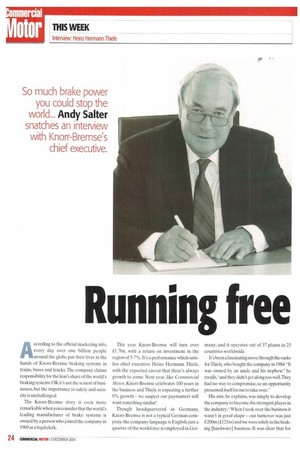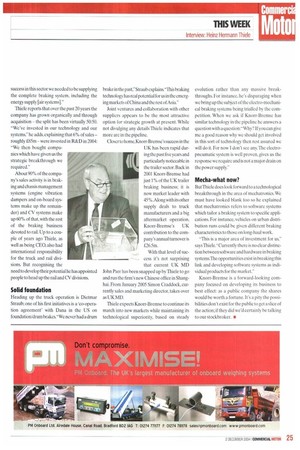Running free
Page 24

Page 25

If you've noticed an error in this article please click here to report it so we can fix it.
According to the official marketing info, every day over one billion people around the globe put their lives in the hands of Knorr-Bremse braking systems in trains, buses and trucks. The company claims responsibility for the lion's share of the world's braking systems. OK it's not the sexiest of businesses, but the importance to safety and security is unchallenged.
The Knorr-Bremse story is even more remarkable when you consider that the world's leading manufacturer of brake systems is owned by a person who joined the company in 1969 as a legal clerk. This year Knorr-Bremse will turn over £1 .7bn, with a return on investment in the region of 5-7%. It's a performance which satislies chief executive Heinz Hermann Thiele, with the expected caveat that there's always growth to come. Next year, like Commercial Motor, Knorr-Brerrise celebrates 100 years in the business and Thiele is expecting a further 8% growth — we suspect our paymasters will want something similar!
Though headquartered in Germany, Knorr-Bremse is not a typical German company: the company language is English; just a quarter of the workforce is employed in Ger many; and it operates out of 37 plants in 25 countries worldwide.
It's been a fascinating move through the ranks for Thiele, who bought the company in 1984: "It was owned by an uncle and his nephew," he recalls. "and they didn't get along too well.They had no way to compromise, so an opportunity presented itself for me totake over."
His aim, he explains, was simply to develop the company to become the strongest player in the industry: "When I took over the business it wasn't in good shape — our turnover was just €200m (£121m) and we were solely in the braking [hardware] business. It was clear that for success in this sector we needed to be supplying the complete braking system, including the energy supply [air systems]."
Thiele reports that over the past 20 years the company has grown organically and through acquisition — the split has been virtually 50:50. "We've invested in our technology and our systems," he adds, explaining that 6% of sales — roughly £85m — were invested in R&D in 2004: "We then bought companies which have given us the strategic breakthrough we required."
About 90% of the company's sales activity is in braking and chassis management systems (engine vibration dampers and on-board systems make up the remainder) and CV systems make up 60% of that, with the rest of the braking business devoted to rail. Up to a couple of years ago Thiele, as well as being CEO, also had international responsibility for the truck and rail divisions. But recognising the need to develop their potential he has appointed people to head up the rail and CV divisions.
Solid foundation
Heading up the truck operation is Dietmar Straub; one of his first initiatives is a 'co-operation agreement' with Dana in the US on foundation/drum brakes." We never had a drum brake in the past," Straub explains."This braking technology has real potential for us in the emerging markets of China and the rest of Asia."
Joint ventures and collaboration with other suppliers appears to be the most attractive option for strategic growth at present. While not divulging any details Thiele indicates that more are in the pipeline.
Closer to home,Knorr-Bremse's success in the UK has been rapid during the past five years and particularly noticeable in the trailer sector. Back in 2001 Knorr-Bremse had just 1 % of the UK trailer braking business; it is now market leader with 45% .Along with its other supply deals to truck manufacturers and a big aftermarket operation, Knorr-Bremse's UK contribution to the cornpany's annual turnover is £26.5m.
•
With that level of success it's not surprising that current UK MD John Parr has been snapped up by Thiele to go and run the firm's new Chinese office in Shanghai. From January 2005 Simon Craddock, currently sales and marketing director, takes over as UK MD.
Thiele expects Knorr-Bremse to continue its march into new markets while maintaining its technological superiority, based on steady evolution rather than any massive breakthroughs. For instance, he's disparaging when we bring up the subject of the electro-meehanical braking systems being trialled by the cornpetition. When we ask if Knorr-Bremse has similar technology in the pipeline he answers a question with a question:"Why? If you can give me a good reason why we should get involved in this sort of technology then rest assured we will do it. For now 1 don't see any. The electropneumatic system is well proven, gives us the response we require and is not a major drain on the power supply.
Mecha-what now?
ButThiele does look forward to a technological breakthrough in the area of meehatronics. We must have looked blank too so he explained that mechatronics refers to software systems which tailor a braking system to specific applications. For instance, vehicles on urban distribution runs could be given different braking characteristics to those on long-haul work.
"This is a major area of investment for us," says Thi ele."Currently there is no clear distinction between software and hardware in braking systems.The opportunities exist in breaking this link and developing software systems as individual products for the market."
Knorr-Bremse is a forward-looking company focused on developing its business to best effect: as a public company the shares would be worth a fortune. It's a pity the possibilities don't exist for the public to get a slice of the action; if they did we'd certainly be talking to our stockbroker. •




















































































































































































